From Tuesday, May 16th through Saturday, May 20th, more than thirty college educators from UW and five community colleges participated in the immersive LAMP Summer Institute held at Camp Sacagawea on Casper Mountain. The educators came together with the goal of mastering active learning techniques with an emphasis on problem-based learning (PBL).
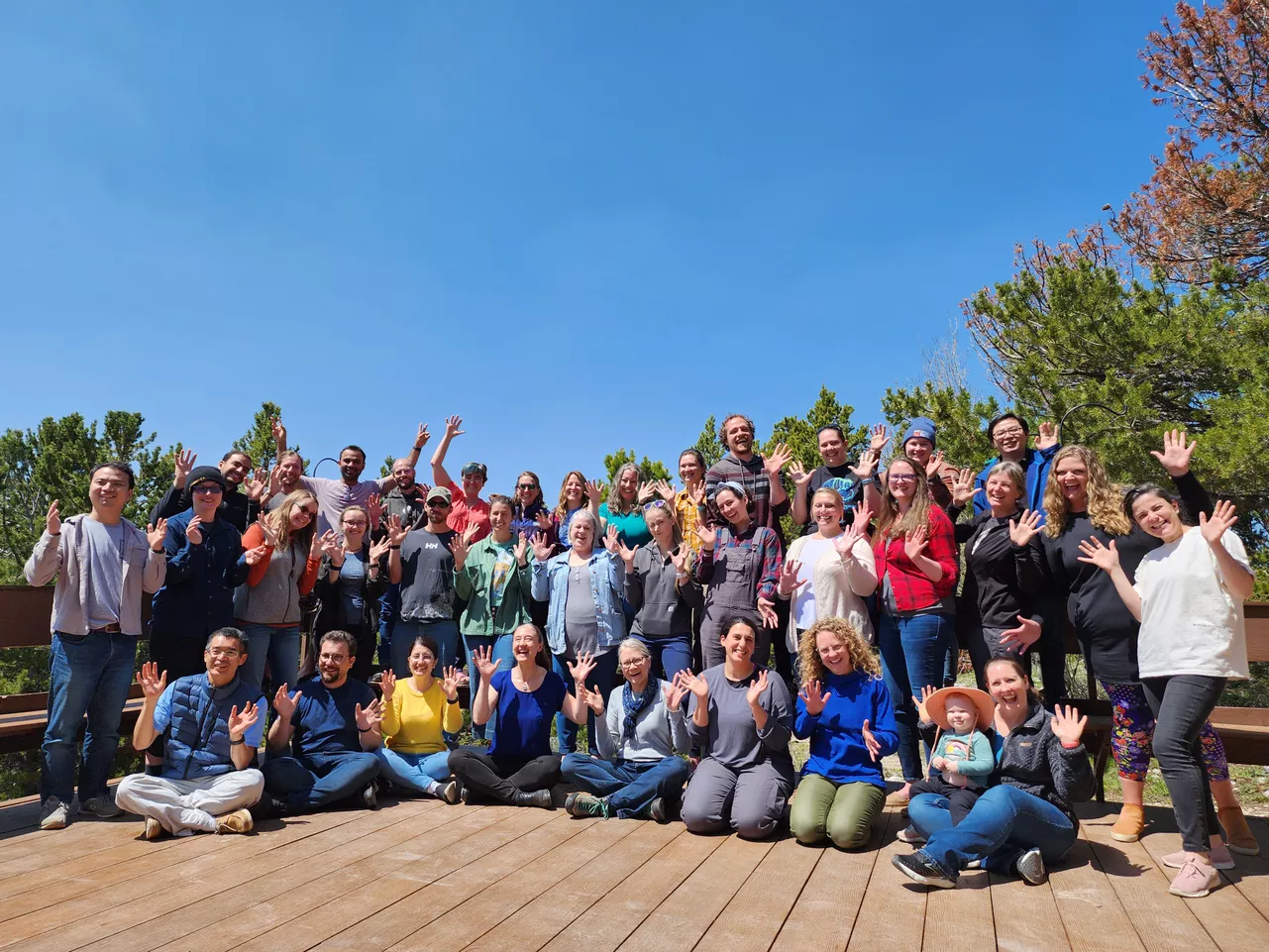
The college instructors completing the LAMP Summer Institute are pictured above at Camp Sacagawea. It is a long tradition to end the week feeling Jazzed with Jazz Hands!
“Problem-based learning is a form of active learning in which students investigate authentic, messy real-world problems with the goal of proposing potential solutions. At the Summer Institute, the UW and community college educators literally became students in a PBL classroom. They were introduced to the wicked problem of Owens Dry Lakebed (the desiccated lakebed formed when water was diverted from the Owens watershed by the LA aqueduct). The now-dry lakebed has been one of the greatest sources of airborne dust laden with toxic metals like arsenic in North America.” LAMP Director, Rachel Watson
The LAMPers began by working in expert teams to activate and contribute their specialty discipline-specific expertise to address the problem. These experts then returned to their home teams to synthesize multi-disciplinary strategies to address the problem.
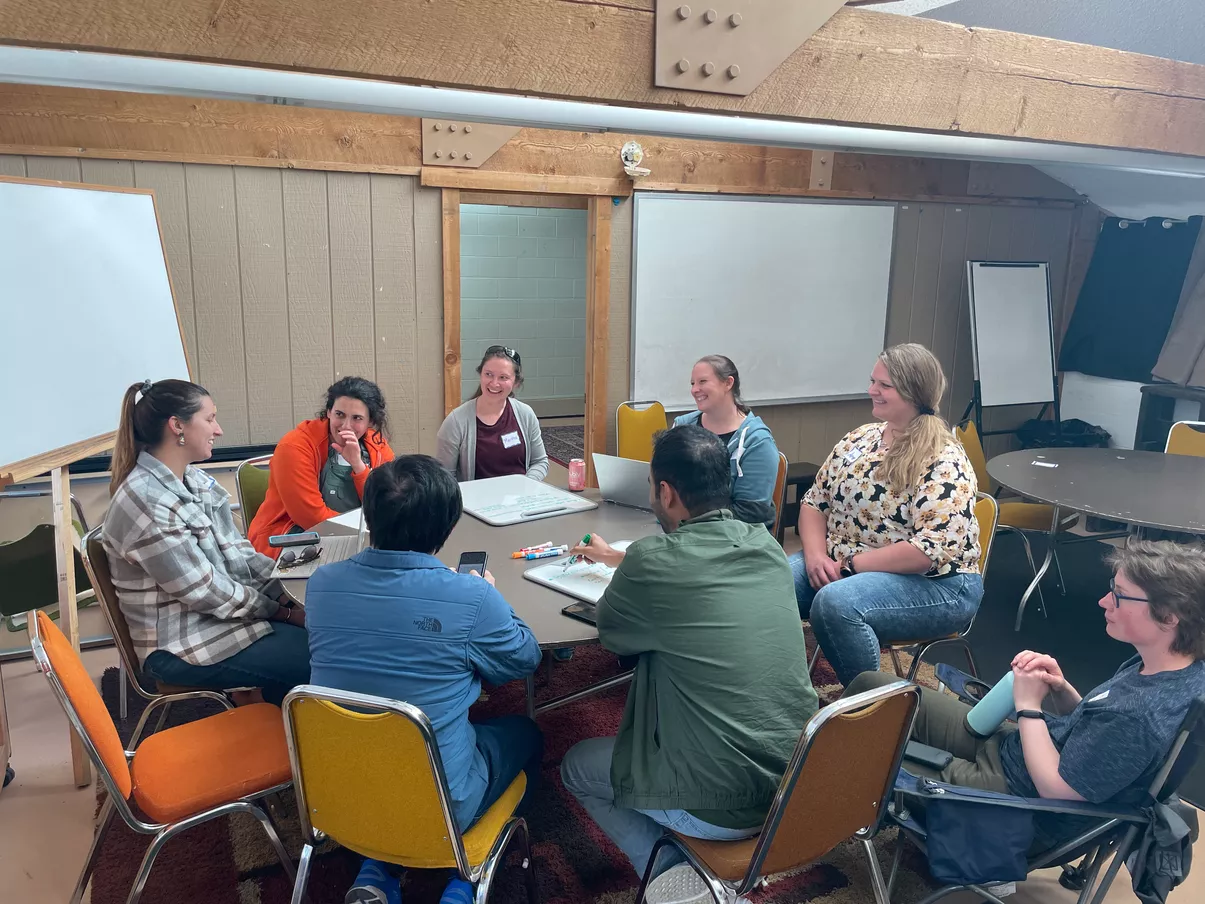
Clockwise from top, Martha Inouye’s home team (Dacia DeBock, Amy Peterson, Jay Fahlsing, Dhawal Jain, Ping Zhong, Sabrina White and Randa Jabbour) work collaboratively to address the Owens Dry Lakebed using problem-based learning.
When asked what it felt like to be a learner in a problem-based classroom, LAMPers often spoke about the value of learning from a diverse team of experts, and shifting from initial unease to later engagement:
- “It felt more engaging - mini lecture describing the problem then the ability to use past skills to address/white board the problem and the work together was nice! I like the sharing element where I learned how other experts would address the problem (i.e. the diversity of ideas, everyone could be involved).”
- “I was cautious about sharing because I wasn’t sure of the expectations of me and my ‘expertise’, however, once we got into the activities I felt welcomed and worthwhile [my input was received well]. It (overall) felt inclusive.”
- “It felt like what I wished my education was like. All math is problem-based, so this is a natural framework for a class.”
In both the lead-in to the problem-solving and as a reflection, the ways in which problem-based learning is an inclusive pedagogy, inviting of diverse learners, was considered. Christine Boggs, Associate Director of the Digital and Inclusive Teaching and Learning division within the Ellbogen Center for Teaching and Learning set the stage for LAMP participants to integrate indigenous ways of knowing into their problem solving.
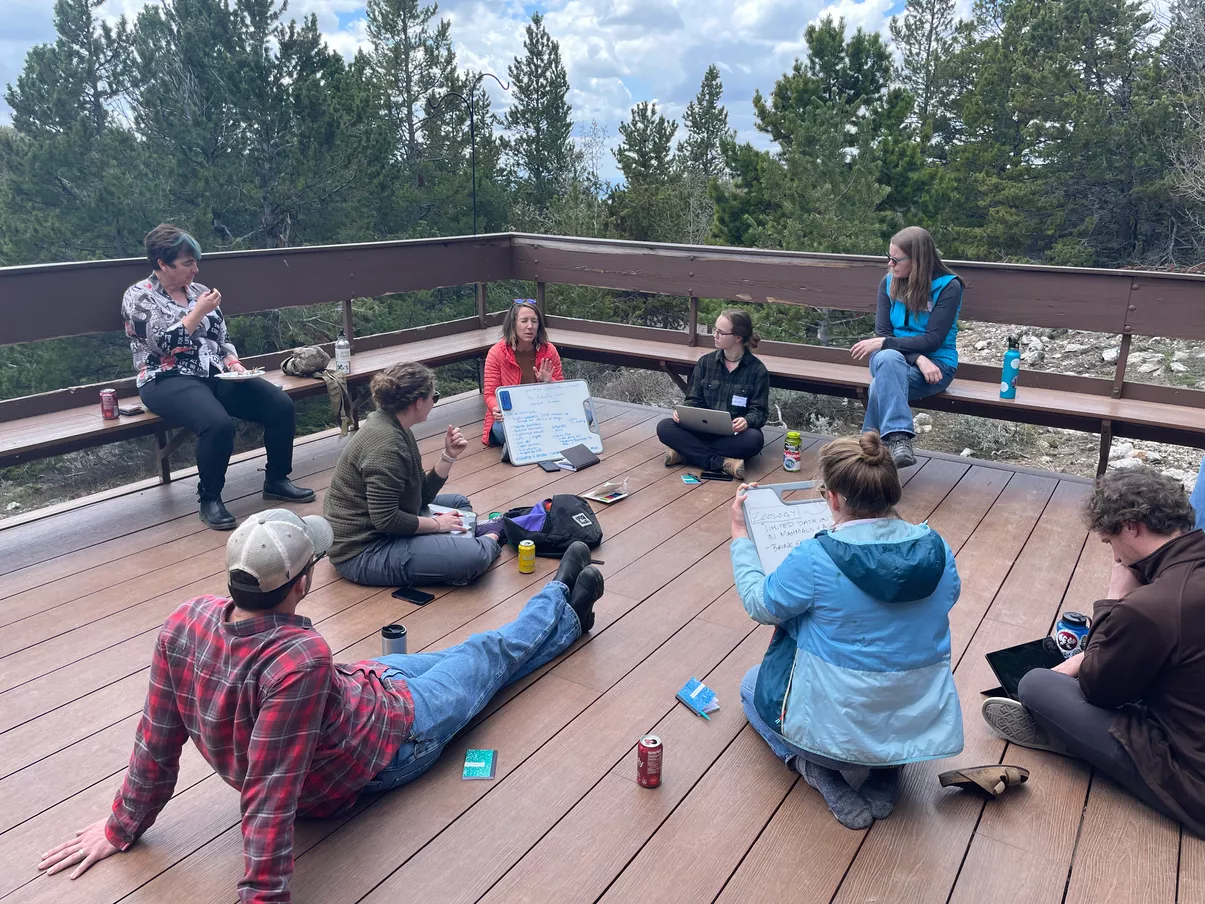
Christi Boggs works with co-mentor Monia Haselhorst to facilitate the problem-solving of their home team (clockwise from Christi sitting on bench at left is Erin Bentley, Riley Bernard, Ali Davies, Monia Haselhorst, Brad Orr, Bree Doehring, and Ryan Webb)
“Opening the problem-based learning with a deep recognition of indigenous ways of knowing, both in our Casper-based location and in the Owens Valley enabled the LAMP participants to begin their teamwork with an inherently more inclusive framework.”
After the PBL, Vice President Zebadiah Hall led the LAMP participants in a session exemplifying the ways in which PBL is a pedagogy of inclusion. He immersed the college educators in exercises that asked them to consider identity and privilege.
During the second day of the Summer Institute, educators continued their problem solving by experiencing a new type of active learning called team-based learning (TBL). TBL is a more structured form of problem-based learning in which learners prepare before coming to class, their readiness is then assessed both individually and within teams. They then spend the rest of the class period applying their knowledge to the problem-solving process. The TBL session at the Summer Institute was led by LAMP Mentor Martha Inouye of the Science and Math Teaching Center. Martha notes, “Being able to experience instruction from the student perspective provides incredible insight when considering what active learning strategies like TBL can look like in one’s own classroom. Educators at LAMP got to experience what it feels like, what it looks like, and what it sounds like to engage in collaborative learning experiences that deepen their understanding of science concepts and skills through a real world context.
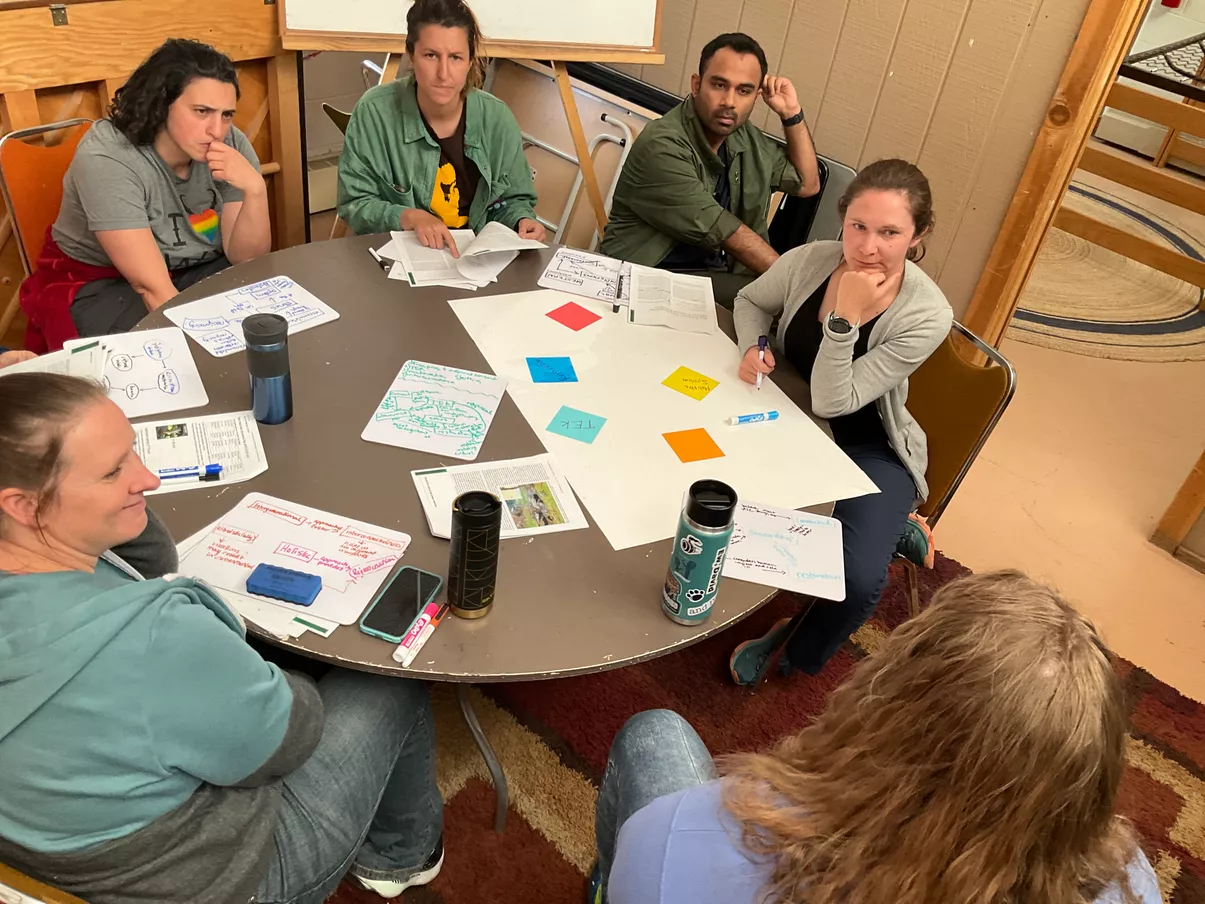
Martha Inouye with her team
The third day of learning was led by UW alumnus (and now faculty member at Colorado Mountain College), Monia Hasselhorst. Monia modified the traditional PBL and TBL approaches to integrate concept mapping.
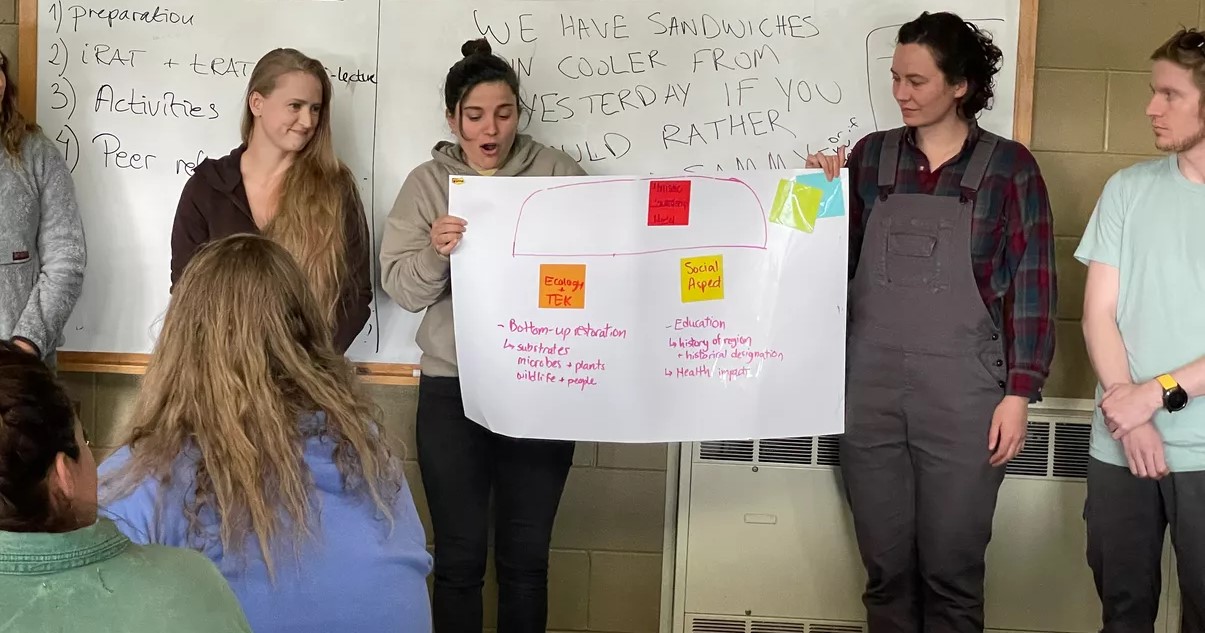
After completing their modified PBL and TBL, LAMP educators each shared elements of their ecological solutions to Owen’s dry lakebed. Pictured here (left to right) are Liana Boggs Lynch, Aysha Demir, Kiana Henny and Cedar Wiseman.
This session served as a smooth segue supporting the LAMP participants in the work that they needed to accomplish during the final days of the institute. Additionally, each day the educators were led in reflective, metacognitive sessions by Ed Nuhfer, a AAAS Fellow, a tenured faculty developer from four institutions and remaining active in retirement as a researcher, faculty mentor and advocate for educating.
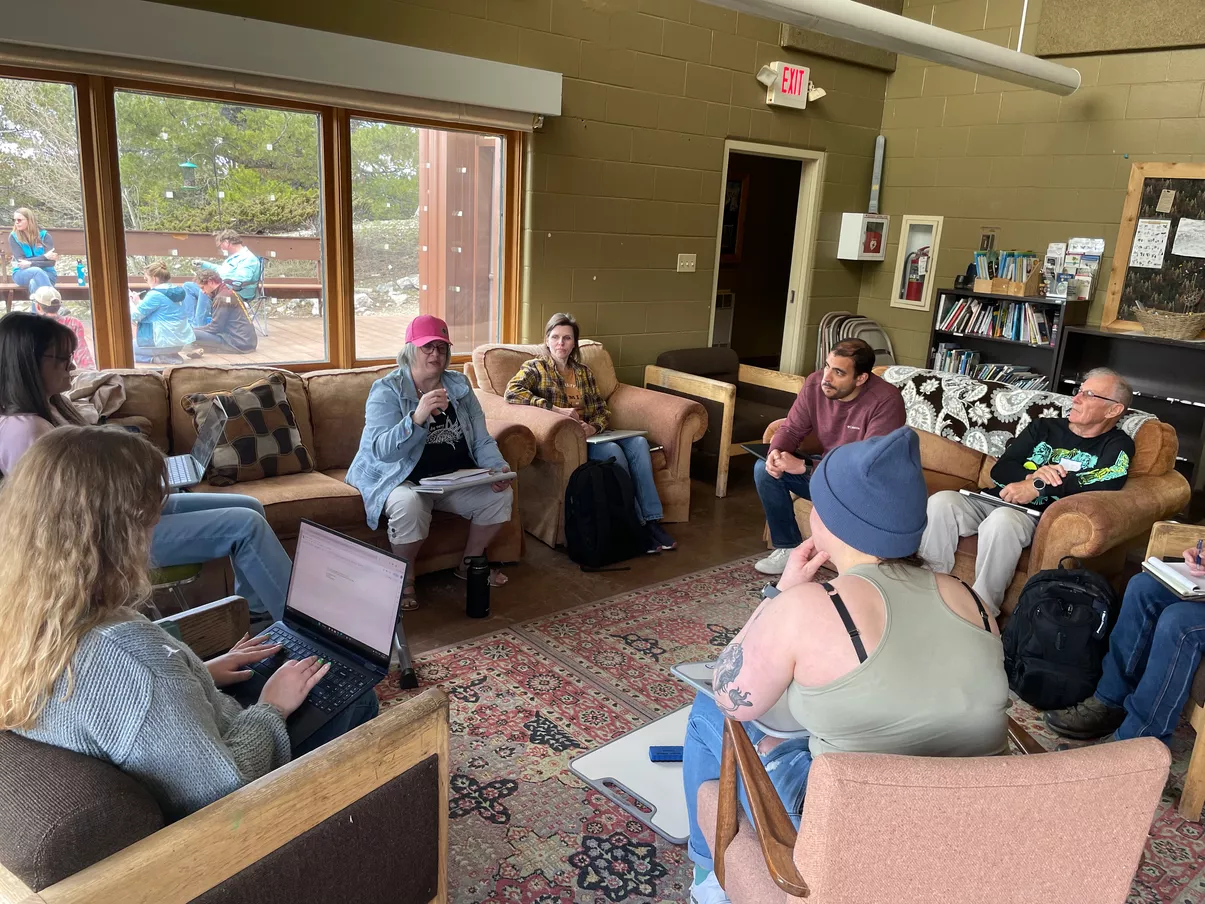
Ed (far right) quietly listens to his team as they problem solve
Ed says, “Training develops content expertise. Becoming educated is about growing capacity as a reflective person—developing awareness, respect, and empathy for self and others while becoming a content expert. Training or Educating? Both have their place, but metacognition enables knowing which we are doing in a given moment and whether that accords with what we intended to do. LAMP is one of the few initiatives that supports faculty to gain the capacity to become educators rather than just trainers. Education is essential to address wicked problems. Mere training cannot achieve that.”
Janel Seeley (Director of the Ellbogen Center for Teaching and Learning) choreographed daily collaborative communication sessions. Collaborative communication is a form of reflective dialogue. Janel relates, “Reflection is an important part of both teaching and learning. We used Collaborative Communication as a means of reflecting together about what we learned throughout our time together. Participating in dialogue with one another helps us learn to examine our own and others assumptions while thinking together on a deeper level than simply reflecting alone. “
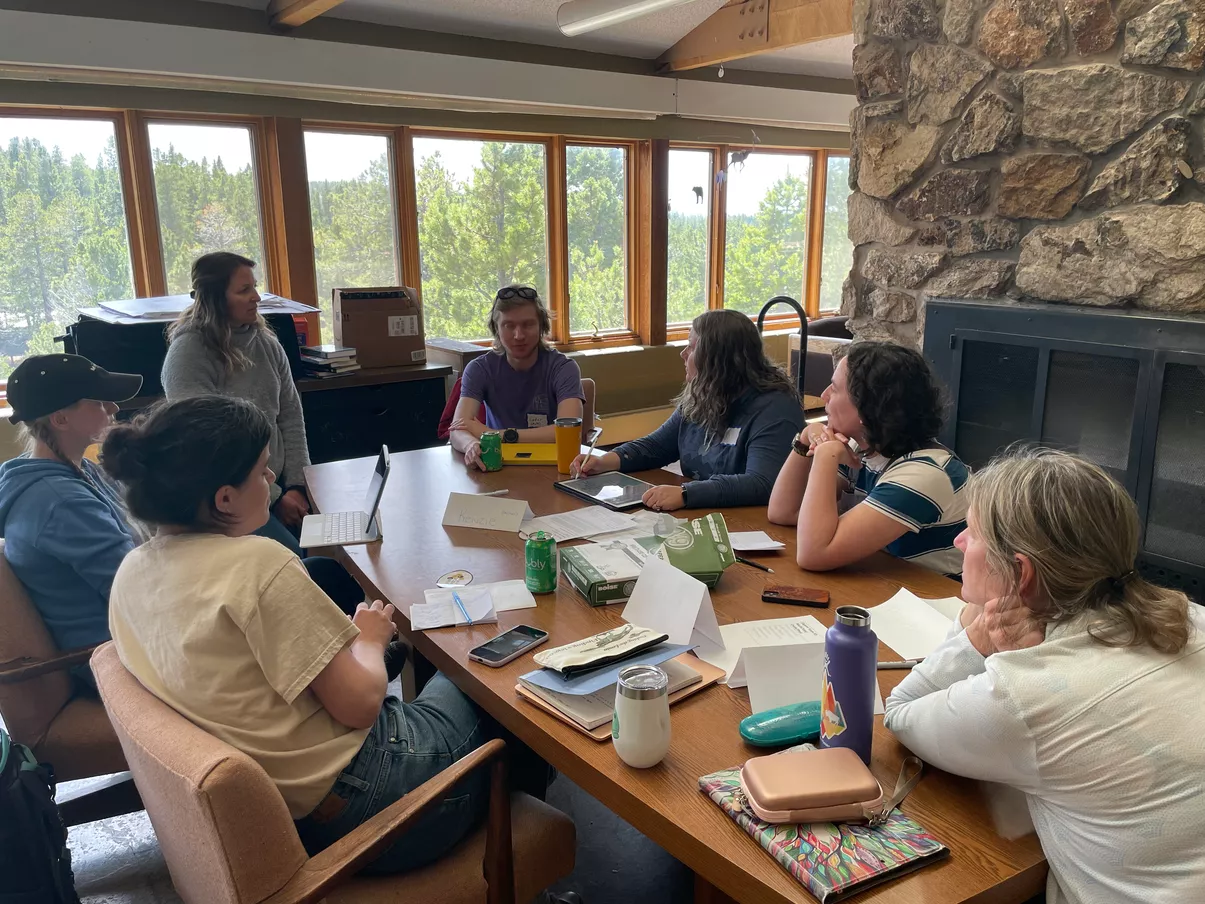
Janel, far right. Clockwise from Janel is Aysha Demir, Liana Boggs-Lynch, Tana Verzuh, Cedar Wiseman, Kass Willingham, and Kiana Henny
To model best practices in active learning, the LAMP educators were also supported by a learning assistant (LA). LAs assist instructors by facilitating team discussions, asking and answering questions and designing some active learning strategies to support learners’ relationship building or the instructors’ formative assessments. Amy Rhoad (faculty in Veterinary Science) served as the LAMP LA for the Summer Institute. Amy notes that, “Learning assistants can be incredibly powerful in the classroom as they help facilitate discussions and teamwork that would not be possible for just the instructor alone. LAs can also gain a lot from the experience as they model the idea of understanding a concept well enough that you can explain it to someone else.”
During the last two days of the Summer Institute, LAMP participants created and presented their own instructional strategy in which they detailed the values informing their strategy, their student learning outcomes, assessment strategies and the active, inclusive learning pedagogies that they will implement to allow students to practice the skills that the educators aim for them to master. Strategies ranged from the use of Team-based learning to enable engineering students to identify, explain and solve problems related to subsurface earth stresses to the use of experiential learning to allow students to practice identifying the mathematical functions that can represent natural phenomena.
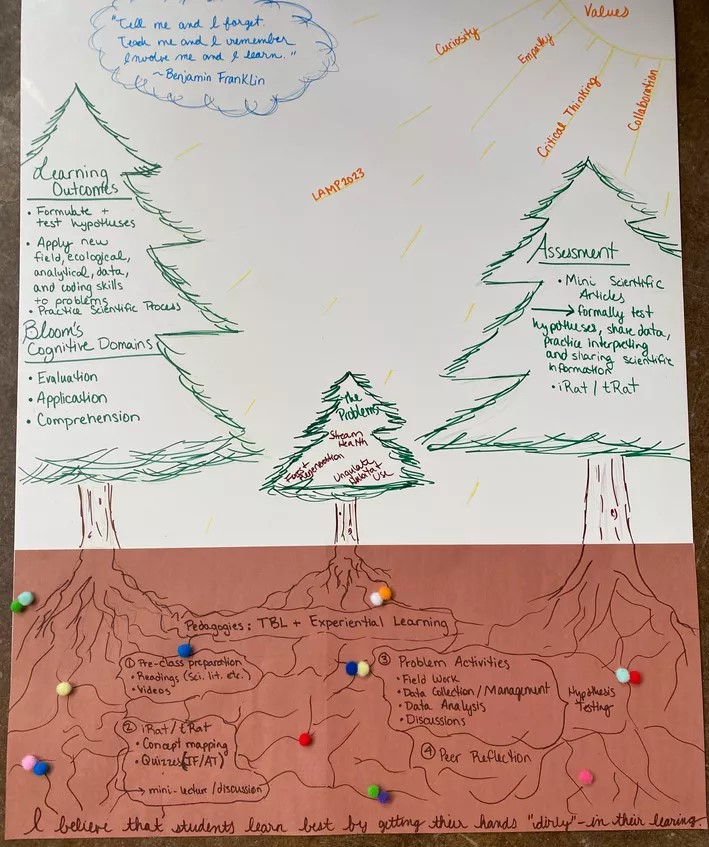
Liana Boggs Lynch’s poster showcases her values as rays of sunshine enabling the growth of her learning outcomes and assessment strategies. Her adoption of team-based learning is shown by her root network.
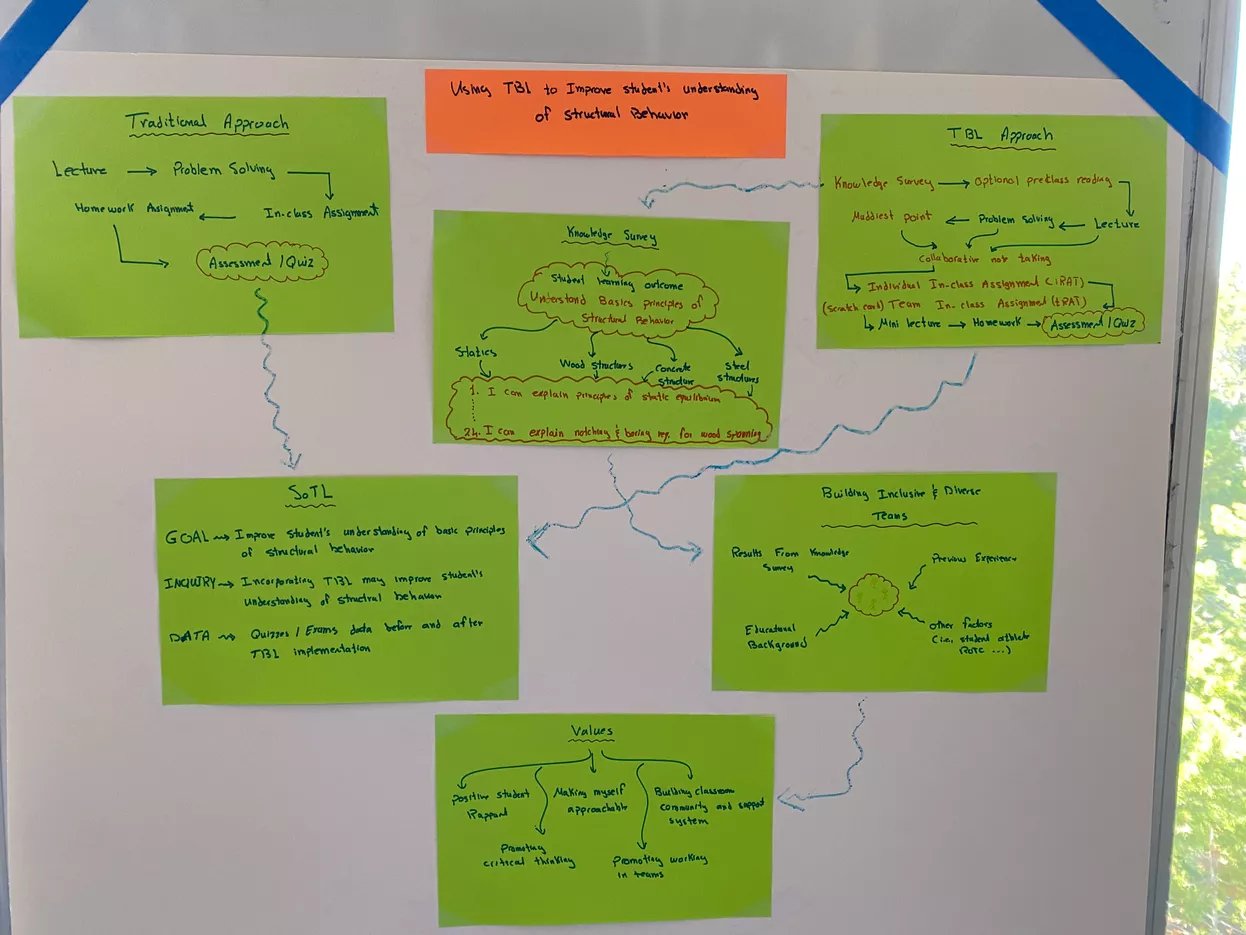
Ahmed Abdelaty’s poster contrasts traditional and team-based pedagogies. His strategy shows his use of knowledge surveys to both assist him in building diverse student teams and assessing student learning.
We invite you to find photos from the Summer Institute here: https://padlet.com/rmimwatson/lamp-camp-photos-f1vdvyude5pzitv9
The College Educators participating in the Summer Institute:
|
Kassandra |
Willingham |
University of Wyoming |
Microbiology |
|
Ahmed |
Abdelaty |
University of Wyoming |
Civil and architectural engineering and construction management |
|
Kui |
Chen |
University of Wyoming |
Chemistry |
|
Michelle |
Blakely |
University of Wyoming |
School of Pharmacy |
|
Ping |
Zhong |
University of Wyoming |
Mathematics and Statistics |
|
Amy |
Peterson |
University of Wyoming |
Communication Disorders |
|
Riley |
Bernard |
University of Wyoming |
Zoology & Physiology |
|
Kayla |
Burd |
Univeristy of Wyoming |
Psychology |
|
Sherri |
Warren |
Eastern Wyoming College |
Mathematics |
|
Bill |
Finney |
Central Wyoming College |
Science |
|
Jacob |
Layer |
University of Wyoming |
Kinesiology & Health |
|
Aysegul |
Demir |
University of Wyoming |
Civil and Architectural Engineering and Construction Management |
|
Zejian |
Zhou |
University of Wyoming |
Electrical Engineering and Computer Science |
|
Dhawal |
Jain |
University of Wyoming |
College of Civil & Architectural Engineering and Construction Management - CEPS |
|
Ryan |
Webb |
University of Wyoming |
Civil Engineering |
|
Cedar |
Wiseman |
University of Wyoming |
Mathematics |
|
Briana |
Doering |
University of Wyoming |
Anthropology |
|
Dacia |
DeBock |
Northwest College |
Associate Degree Nursing |
|
Austin |
Madson |
Univeristy of Wyoming |
WyGISC |
|
Amy |
Krist |
University of Wyoming |
Zoology & Physiology |
|
Randa |
Jabbour |
University of Wyoming |
Plant Sciences |
|
Liana |
Boggs Lynch |
University of Wyoming |
Botany/LIFE Sciences Program |
|
Erin |
Nitschke |
Laramie County Community College |
Exercise Science/Exercise Physiology |
|
Marie |
Yearling |
Laramie County Community College |
Microbiology |
|
Tana |
Verzuh |
University of Wyoming |
Zoology and Physiology/ Program in Ecology |
|
Erin |
Bentley |
University of Wyoming |
Program in Ecology and Evolution |
|
Sheida |
Sheikheh |
University of Wyoming |
Energy and Petroluem Engineering |
|
Ashleigh |
Pilkerton |
University of Wyoming |
Program in Ecology, Department of Zoology and Physiology, Wyoming Cooperative Fish and Wildlife Research Unit |
|
Kiana |
Henny |
University of Wyoming |
Physics-Astronomy |
|
Brad |
Orr |
University of Wyoming |
Engineering Shop/Mechanical Engineering |
|
Claudia |
Richbourg |
University of Wyoming |
Botany/ Program in Ecology |
|
Alathea |
Davies |
University of Wyoming |
Chemistry |
|
Sabrina |
White |
University of Wyoming |
Zoology and Physiology Department / MS |
|
Kelli |
McCall |
Colorado Mountain College |
All subjects for English Language Learners |
|
Jay |
Fahlsing |
University of Wyoming |
Science Initiative |
Quotes from LAMP Fellows
- My ability to recognize active learning, backward and inclusive pedagogies has greatly improved. I was using some of these pedagogies prior to LAMP, but now I see how they align with my learning outcomes and values/beliefs. My hope is that this new recognition will assist me in modifying my other courses to be even more inclusive and reflective.
- I feel like I finally have the confidence and knowledge to make some small and large changes in my courses, and that my students will benefit immensely.
- I have learned much more about implementing active learning strategies and have made lots of friends for teaching advice!
- This will help me link class assignments and evaluations to the overall course learning outcomes. It will also help me identify other potential assessment methods that are better aligned with my courses.

